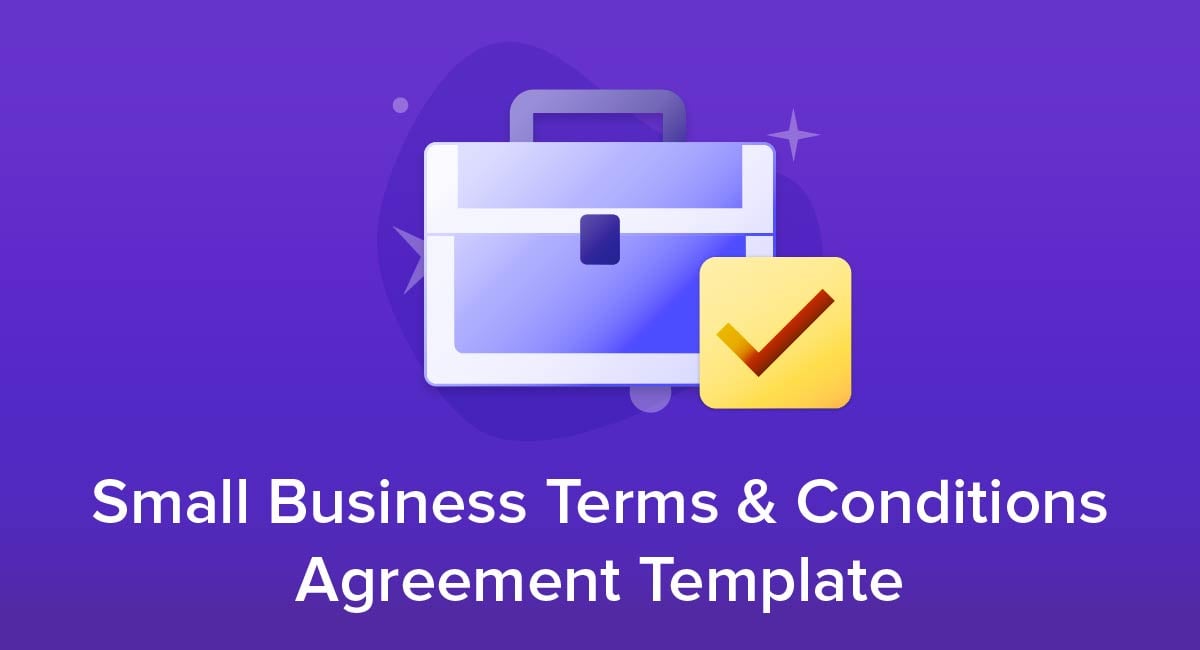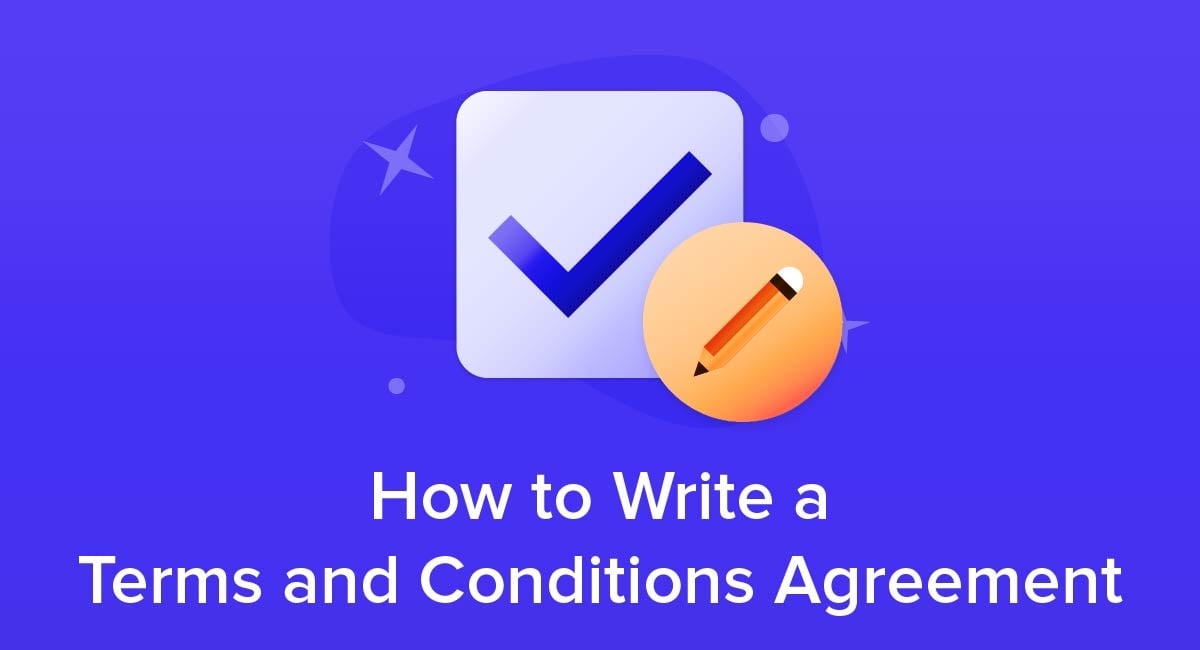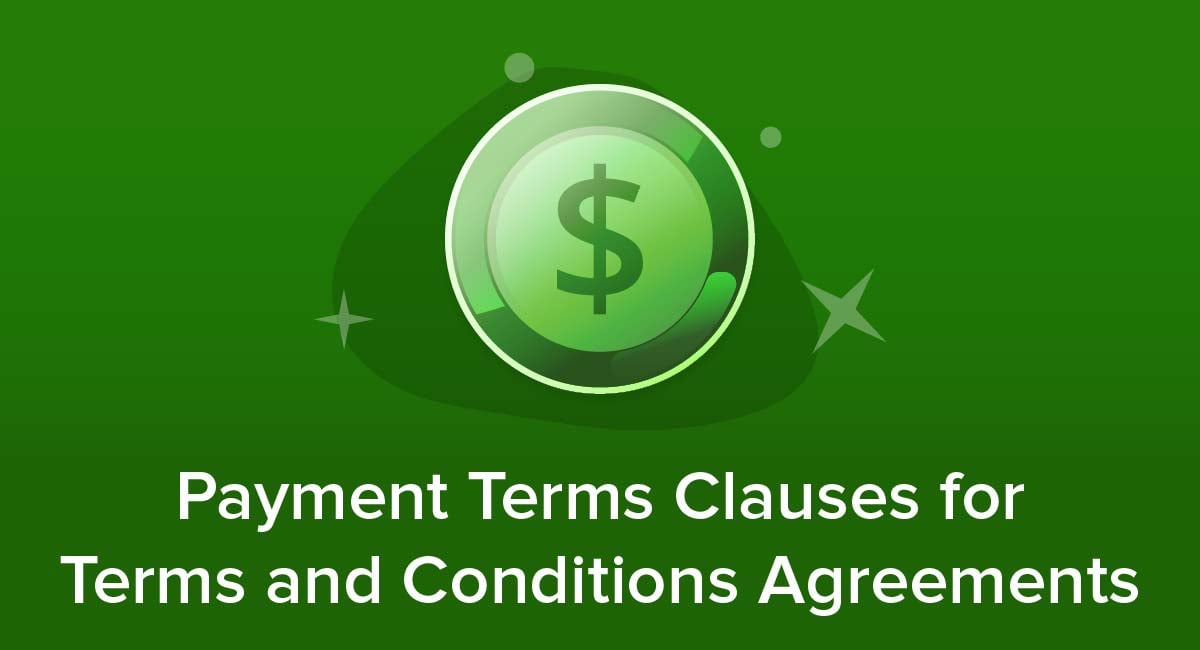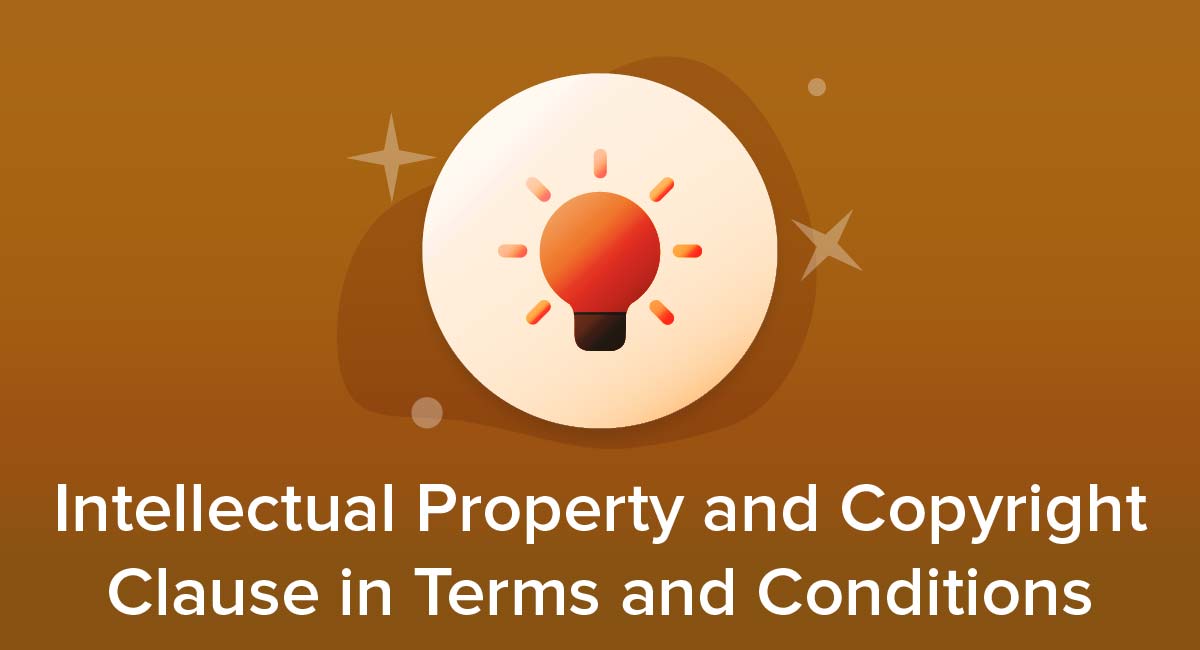
Whenever you post content on your website or allow your customers to post their own content, you need to consider the intellectual property implications.
A clearly written clause (or clauses) in your Terms and Conditions agreement will set out the legal situation and reduce the risk of intellectual property violations. It can also make it easier to enforce your own rights or defend yourself against claims of breaching other people's rights.
Here's what you need to know about these clauses, how to create one and how to display one.
Our Free Terms and Conditions Generator is created to help you generate a professionally drafted agreement that can include various terms and conditions for your site and/or app.
- Start the Free Terms and Conditions Generator from our website.
- Select platforms where your Terms and Conditions will be used (website, app or both):
- Answer a few questions about your website or app information:
- Select the country:
- Answer a few questions about your business practices:
-
Enter your email address where you'd like to receive the new Free Terms and Conditions and click "Generate":
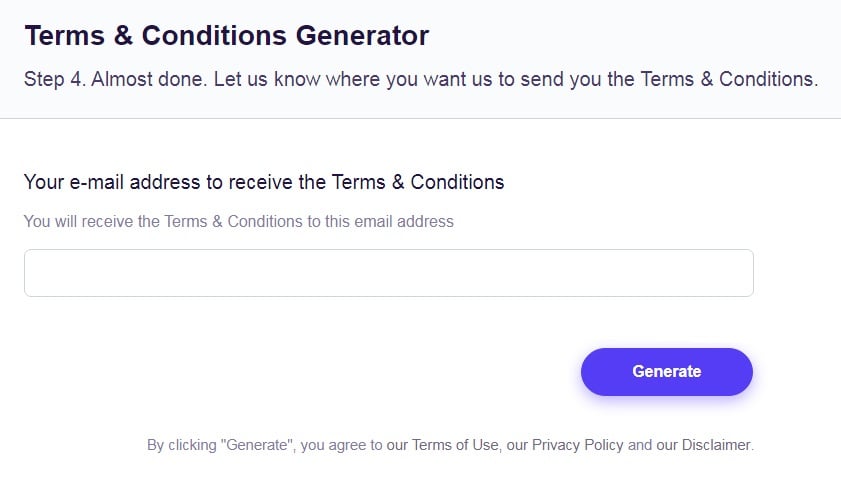
Once generated, you can copy and paste your Free Terms and Conditions agreement on your website or app or link to your hosted Free Terms and Conditions page.
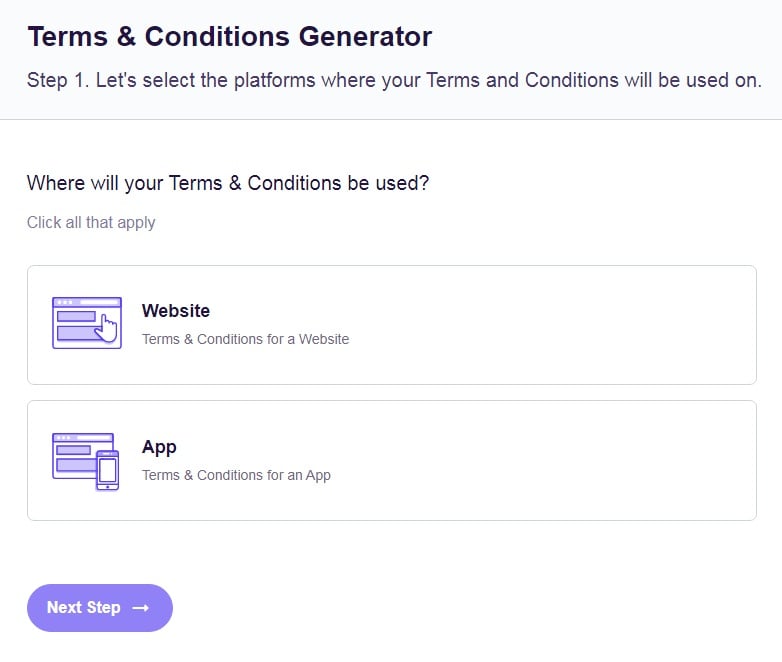
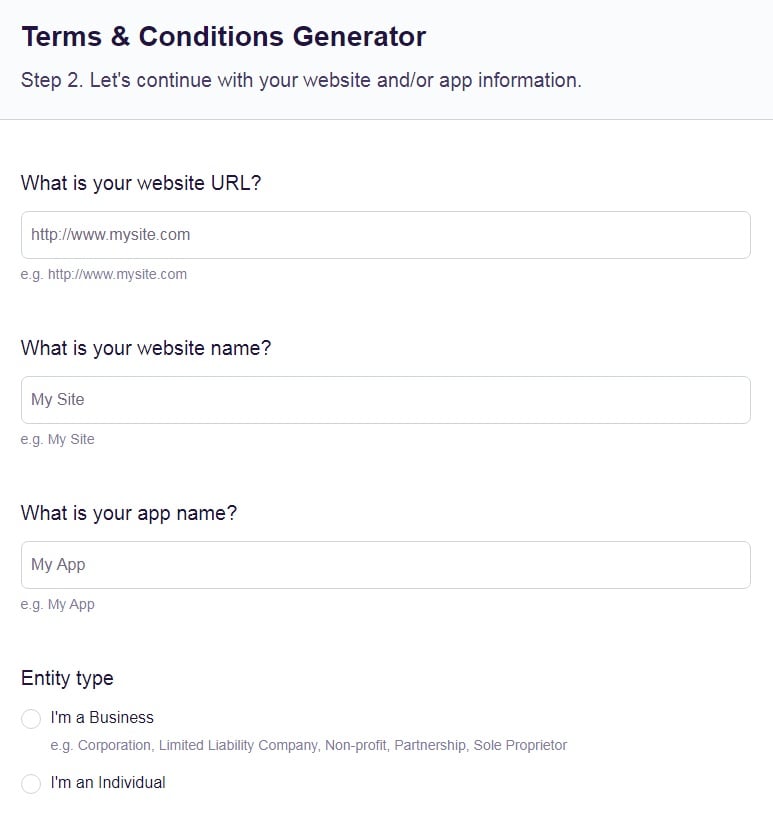
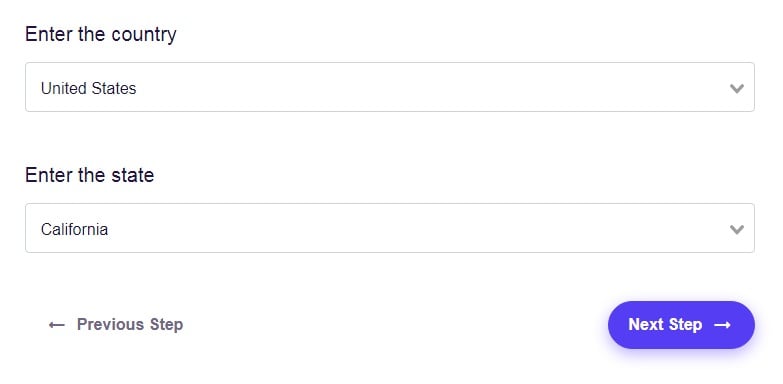
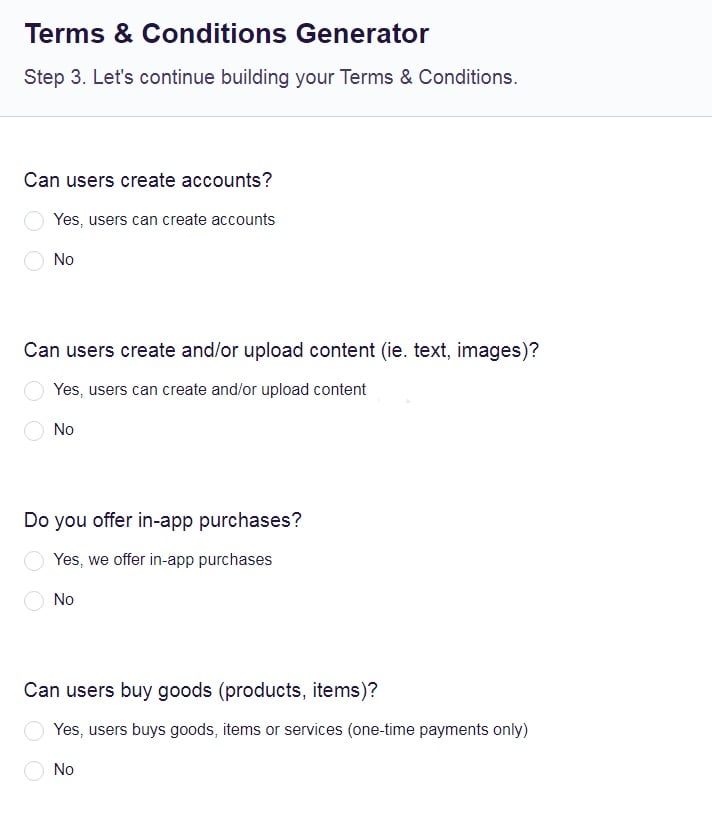
- 1. What is Intellectual Property?
- 1.1. Copyright
- 1.2. Trademarks
- 1.3. Patents
- 2. What Do Intellectual Property Clauses Need to Cover?
- 2.1. Protecting Your Own Intellectual Property
- 2.2. Addressing Your Customers' Intellectual Property
- 2.3. Preventing Third-Party Infringement
- 3. Displaying Your Terms Agreement With an Intellectual Property Clause
- 4. Summary
What is Intellectual Property?
'Intellectual property' covers a variety of ideas, methods and forms of expression that have value and can be owned, despite not being tangible. Your Terms and Conditions agreement may need to cover some or all of the three following types of intellectual property.
Copyright
Copyright covers things like writing, images, video and music, all of which involve an original expression of ideas. A copyright holder has the exclusive rights to use this expression (such as a piece of writing) for a certain number of years depending on the jurisdiction.
Although the rules vary in different places, the usual system is that copyright automatically exists as soon as you create the relevant work, without the need for registration.
Some jurisdictions offer extra benefits or protection if you register copyright. For example, registered copyrights may qualify for statutory damages in the case of a violation. This means the person who breached the copyright has to pay money as a punishment, above and beyond any money they have to pay to cover the actual damages the copyright holder suffered.
Trademarks
Trademarks are words, phrases and designs that identify a product or service of a business. Often trademarks must be registered and approved by a government agency to have legal protection.
Each jurisdiction has its own rules on how detailed or original the trademark must be and it will often only apply to use in a particular context.
As an example, you might get a trademark for the name "Acme Widgets" or the slogan "Low Cost, High Performance."
Patents
These cover inventions. Usually they cover methods for doing something. In most jurisdictions, you need to get a government agency to review and approve a patent application and will normally need to reach a specific level of detail and originality.
For example, if you simply had the idea of a widget that changed color when it was wearing out and likely to fail, you usually couldn't protect the idea. However, if you designed a mechanism for such a feature to work, you would have a good chance of being granted a patent on it.
What Do Intellectual Property Clauses Need to Cover?

The reason you may need either a detailed clause or multiple clauses is that your Terms and Conditions could cover rights and violations in different ways depending on who owns the relevant intellectual property.
Specifically, you need to think about:
- Protecting your own intellectual property
- Addressing your users' intellectual property
- Defending yourself and your users against claims of violating a third party's intellectual property
Let's break these down in detail.
Protecting Your Own Intellectual Property
Different jurisdictions have different requirements for when and how you need to make clear that you have (and are asserting) intellectual property rights.
The main reasons to address your rights are:
- To reduce the likelihood of somebody violating your rights
- To make it easier to counter somebody arguing that they violated your rights unintentionally or that the rights don't apply
- To address situations where you are allowing somebody to use your intellectual property and to establish the limits of this permission
PwC spells out the full extent of its copyright:
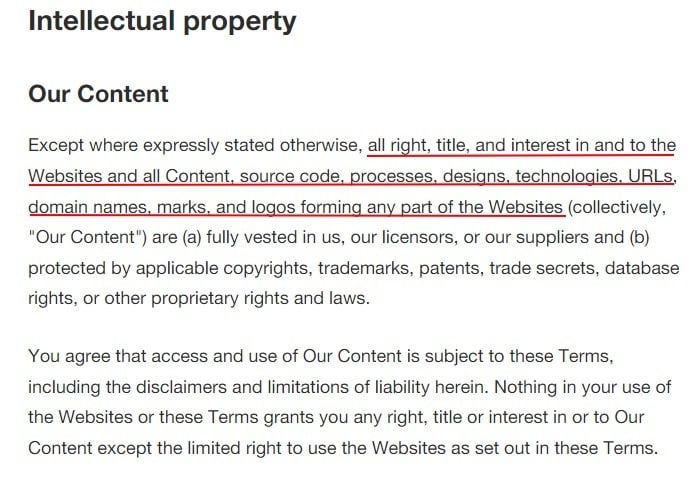
GoCompare gives specific details of how people can use its material without violating intellectual property rights:
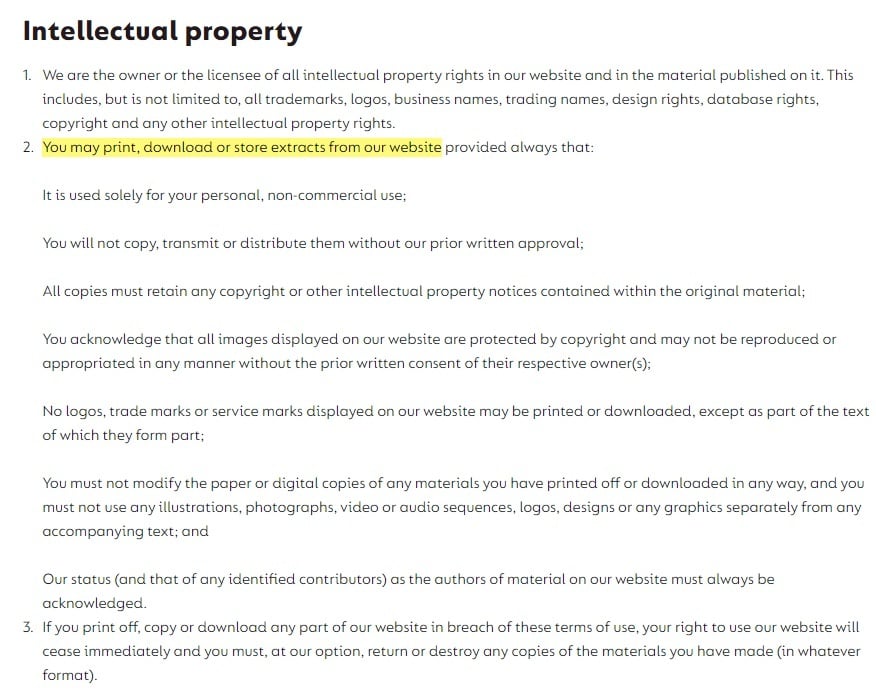
Addressing Your Customers' Intellectual Property
If you allow user-generated content on your site, you need to:
- Make clear who has the intellectual property rights
- Be certain when and how you have permission to use them
- Protect yourself against claims you violated somebody's rights
Situations where this might apply include:
- Social media sites
- Photo-sharing sites
- Sites with a message board
- Sites with a user review feature
The most common approach is to agree and establish that the person who generates the material owns and retains the intellectual property rights, but gives you a license to use it on the site.
Google spells out exactly which rights it asks users to license:
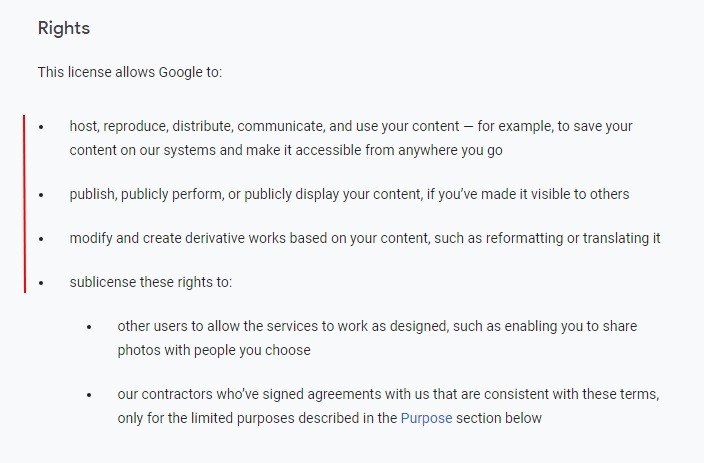
You may need to establish what limits apply to this license, for example whether you are allowed to reproduce the material on other sites you operate, or whether you can reproduce it in marketing material.
You could also make clear that you are not required to make any payment for using the material.
Preventing Third-Party Infringement
There is little if any point including clauses that say you are not responsible if any material you post yourself infringes any copyright. Phrases such as "no copyright infringement intended" have no legal effect.
However, it may be useful to say you will take down any material if you become aware that it breaches copyright: such a term may help quickly resolve a claim without the rightsholder taking legal action.
Stitcher tells rights holders how to report an alleged infringement:
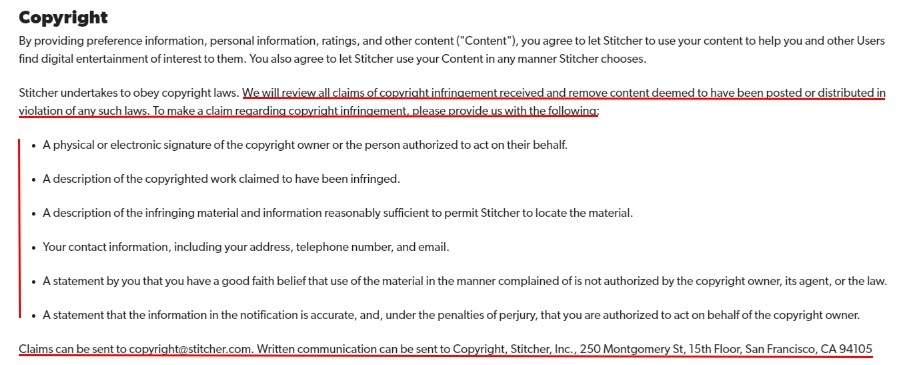
You should, however, address what happens if your users generate and post material that breaches copyright. How much legal protection this offers you will depend on the jurisdiction and whether you moderate material before it goes "live" on your site.
The most common approach is to make clear in your Terms and Conditions agreement that you will remove any material that infringes on somebody's intellectual property rights.
This serves three purposes:
- It may deter users from posting such material in the first place
- It will reduce the risk of the user complaining or threatening to take action against you for removing their content
- It will show good faith to the intellectual property rights holder and may reduce the chances of them pursuing legal action against you for hosting the material
Although a little wordy, Cliveden's Terms of Use makes clear it can delete user material that violates intellectual property rights:
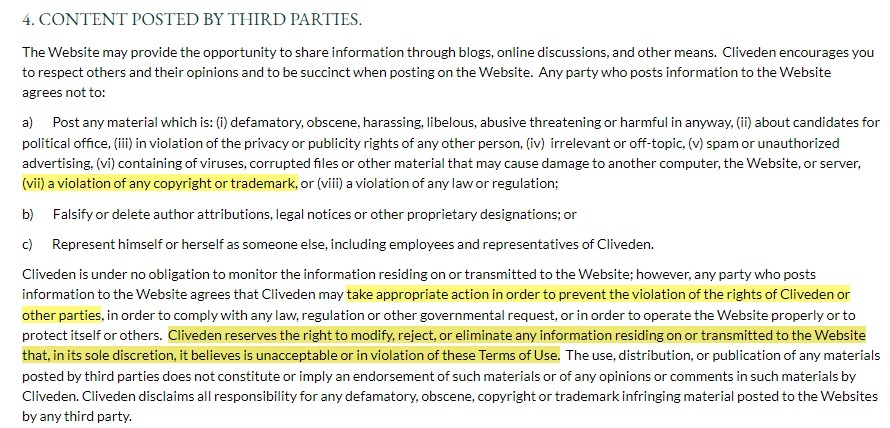
You could go a step further and say you will suspend or ban users from your site if they post such material.
If you charge a fee to use your site, you should be clear about whether or not the user gets any refund if you suspend or revoke their access for posting such material. If your policy is to not issue any refund, you should make this absolutely clear in your Terms and Conditions agreement as it forms part of your contract with the user.
Displaying Your Terms Agreement With an Intellectual Property Clause
In most cases, the intellectual property clause (or clauses) best fits in the Terms and Condition section of your site. It could also fit in any terms of use or user agreement, particularly if you allow users to post material or charge a fee to access parts of your site.
The more prominent and available you make such clauses, the less risk of users claiming they didn't see it. For a free access site, you can include a Terms and Conditions agreement in a "legal" section alongside your Privacy Policy and similar documents. If you include this in your navigation menu, users can easily reach it from every page on your site.
You can also link to the documents at the point users sign up for an account (for example, to post content) and ask them to confirm they have read and agreed to the terms. You should also do this at the point where users pay for any premium services.
Twitter requires users to agree to its Terms of Service, which address intellectual property, before creating an account and being able to post content:
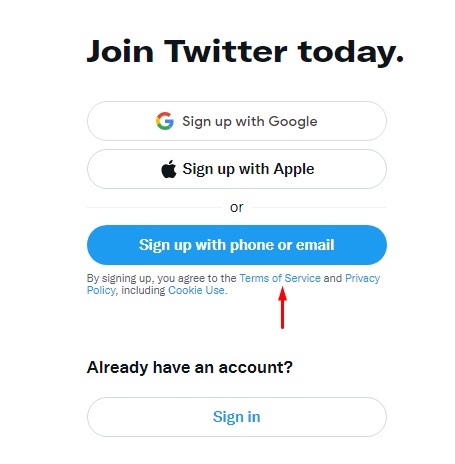
Summary
Let's recap what you need to know about intellectual property clauses.
-
Intellectual property involves three protected rights:
- Copyright, meaning an expression of an idea, such as writing
- Trademarks, meaning a word, term or design associated with a company or product
- Patents, meaning a method of doing something (an invention)
- An intellectual property clause protects your rights and reduces the risk of infringement by you or your users
- Establishing or asserting your rights can deter violations and make the rights easier to protect
- If you allow user-generated content, you should establish who owns what rights. Normally you would agree that the user retains their rights but licenses you to use the content.
- Your Terms and Conditions agreement or Terms of Use should ban users from uploading content that breaches a third party's intellectual property rights and makes clear you will remove such content.
- You could also suspend or ban users who do this. If you do this with a paid service you should say whether such users will get a refund.
- You should display the intellectual property clause in your general Terms and Conditions. You should also highlight it, and make sure the user agrees to it, before they create an account or pay for a service.
